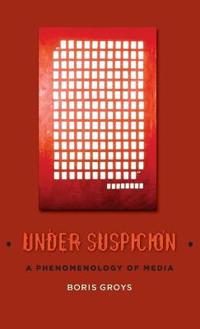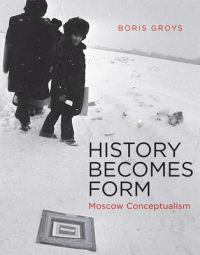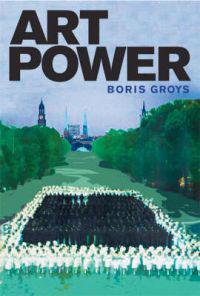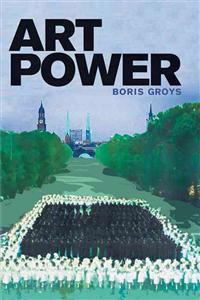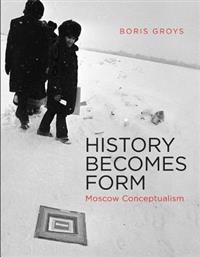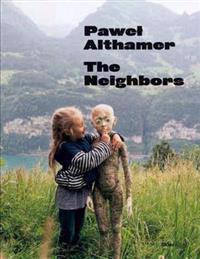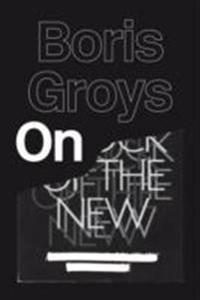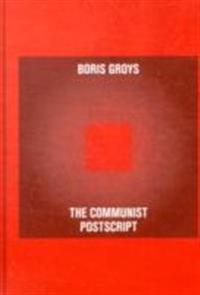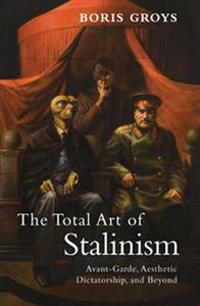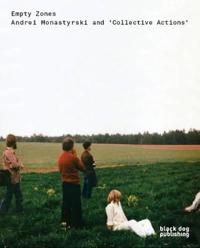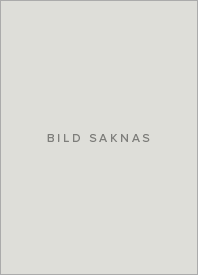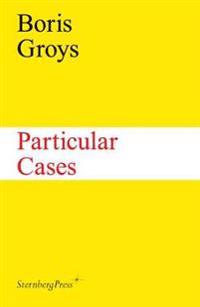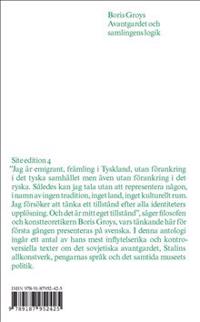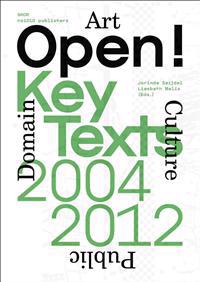The Art of Participation (Inbunden)
avGroys, Boris
ISBN: 9780500238585 - UTGIVEN: 2008-10-20The first fully illustrated survey of participatory art and its key practitioners, published in association with the San Francisco Museum of Modern Art.
This new survey covers the rich and varied history of participatory art, from early happenings and performances to current practices that deman[...]Under Suspicion (Inbunden)
avBoris Groys
ISBN: 9780231146180 - UTGIVEN: 201205The public generally regards the media with suspicion and distrust. Therefore, the media's primary concern is to regain that trust through the production of sincerity. Advancing the field of media studies in a truly innovative way, Boris Groys focuses on the media's affect of sincerity and its manuf[...]
History Becomes Form (Inbunden)
avBoris Groys
ISBN: 9780262014236 - UTGIVEN: 201010In the 1970s and 1980s, a group of "unofficial" artists in Moscow -- artists not recognized by the state, not covered by state-controlled media, and cut off from wider audiences -- created artworks that gave artistic form to a certain historical moment: the experience of Soviet socialism. The Moscow[...]
Art Power (Inbunden)
avBoris Groys
ISBN: 9780262072922 - UTGIVEN: 200803Art has its own power in the world, and is as much a force in the power play of global politics today as it once was in the arena of cold war politics. Art, argues the distinguished theoretician Boris Groys, is hardly a powerless commodity subject to the art market's fiats of inclusion and exclusion[...]
Art Power (Häftad)
avBoris Groys
ISBN: 9780262518680 - UTGIVEN: 201303Art has its own power in the world, and is as much a force in the power play of global politics today as it once was in the arena of cold war politics. Art, argues the distinguished theoretician Boris Groys, is hardly a powerless commodity subject to the art market's fiats of inclusion and exclusion[...]
History Becomes Form (Häftad)
avBoris Groys
ISBN: 9780262525084 - UTGIVEN: 2013-10In the 1970s and 1980s, a group of "unofficial" artists in Moscow -- artists not recognized by the state, not covered by state-controlled media, and cut off from wider audiences -- created artworks that gave artistic form to a certain historical moment: the experience of Soviet socialism. The Moscow[...]
Pawel Althamer (Häftad)
avMassimiliano Gioni, Gary Carrion-Murayari, Boris Groys
ISBN: 9780847844234 - UTGIVEN: 2014-03Over the past twenty years, Pawe? Althamer has established a singular artistic practice featuring an expanded approach to sculptural representation and experimental models of social collaboration. This publication includes extensive documentation of his groundbreaking sculptures, performances, and p[...]
On the New (Häftad)
avBoris Groys
ISBN: 9781781682920 - UTGIVEN: 2014-06"On the New" looks at the economies of exchange and valuation that drive modern culture's key sites: the intellectual marketplace and the archive. As ideas move from one context to another, newness is created. This continuous shifting of the line that separates the valuable from the worthless, cultu[...]
The Communist Postscript (Inbunden)
avBoris Groys
ISBN: 9781844674305 - UTGIVEN: 201001The contemporary world, argues Boris Groys, was made possible by the downfall of historical communism. At the same time, today's political and aesthetic strategies - from a unified Europe to political Islam and contemporary mass culture - all bear the imprint of communist heritage. The renowned art [...]
The Total Art of Stalinism (Häftad)
avBoris Groys
ISBN: 9781844677078 - UTGIVEN: 201107From the ruins of communism, Boris Groys emerges to provoke our interest in the aesthetic goals pursued with such catastrophic consequences by its founders. Interpreting totalitarian art and literature in the context of cultural history, this brilliant essay likens totalitarian aims to the modernist[...]
Introduction to Antiphilosophy (Inbunden)
avBoris Groys
ISBN: 9781844677566 - UTGIVEN: 201203Traditional philosophy, claims Boris Groys in this provocative new work, promised to satisfy the desire for knowledge. But why should I bother with knowledge and philosophy at all? What motives lead me to such a project? Antiphilosophy in its various guises is directed not against this or that parti[...]
Ilya Kabakov: The Man Who Flew Into Space from His Apartment (Pocket)
avBoris Groys
ISBN: 9781846380044 - UTGIVEN: 2006-05-01The fictitious hero of this 1984 installation is a lonely dreamer who develops an impossible project: to fly alone in cosmic space. But this dream is also an individual appropriation of a collective Soviet project and the official Soviet propaganda connected to it. Having built a makeshift slingshot[...]
Boris Groys (häftad)
ISBN: 9781934105306 - UTGIVEN: 2011-02If all things in the world can be considered sources of aesthetic experience, suggests media critic and philosopher Boris Groys, then art no longer holds a privileged position. Rather, art comes between the subject and the world, and any aesthetic discourse used to legitimize art must also necessari[...]
Reality strikes back (Häftad)
avBoris Groys, Friedrich Kittler, Klaus Theweleit
ISBN: 9783934344501 - UTGIVEN: 200712In den Darstellenden Künsten steigt der Marktwert des Realen unaufhaltsam. ?Reality?-Show-Formate werden für die Bühne adaptiert und die Beuys-Formel ?Jeder Mensch ist ein Künstler? wandelt die Bühne in ein ?Jedermann ist ein Schauspieler? ab. In der aktuellen Inszenierungspraxis der [...]
Open! Regarding Art, Culture & the Public Domain. Key Texts, 2004-2012 (Häftad)
avWolfgang Ernst, Boris Groys, Brian Holmes
ISBN: 9789462080034 - UTGIVEN: 201207Since 2004, "Open" has conducted an interdisciplinary investigation into the changing conditions of public space, fostering new ideas about the public sphere and focusing on the impact of current processes of privatization, mediatization and globalization on society and cultural production. This vol[...]


